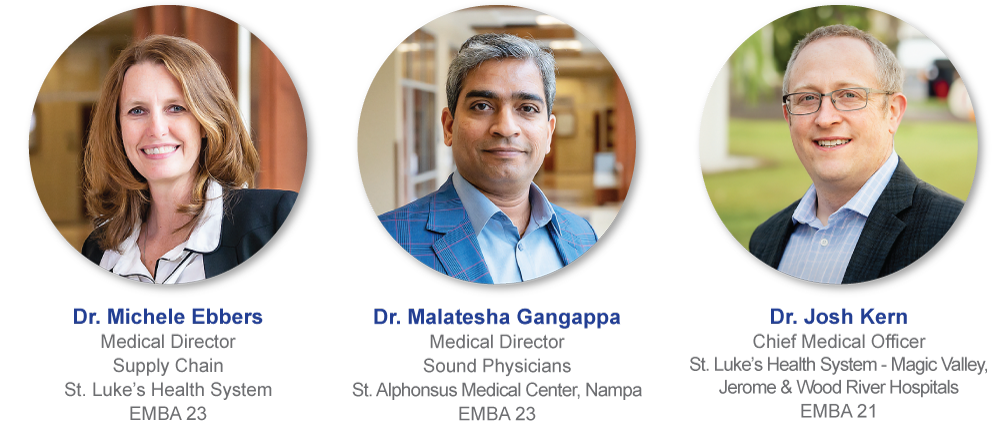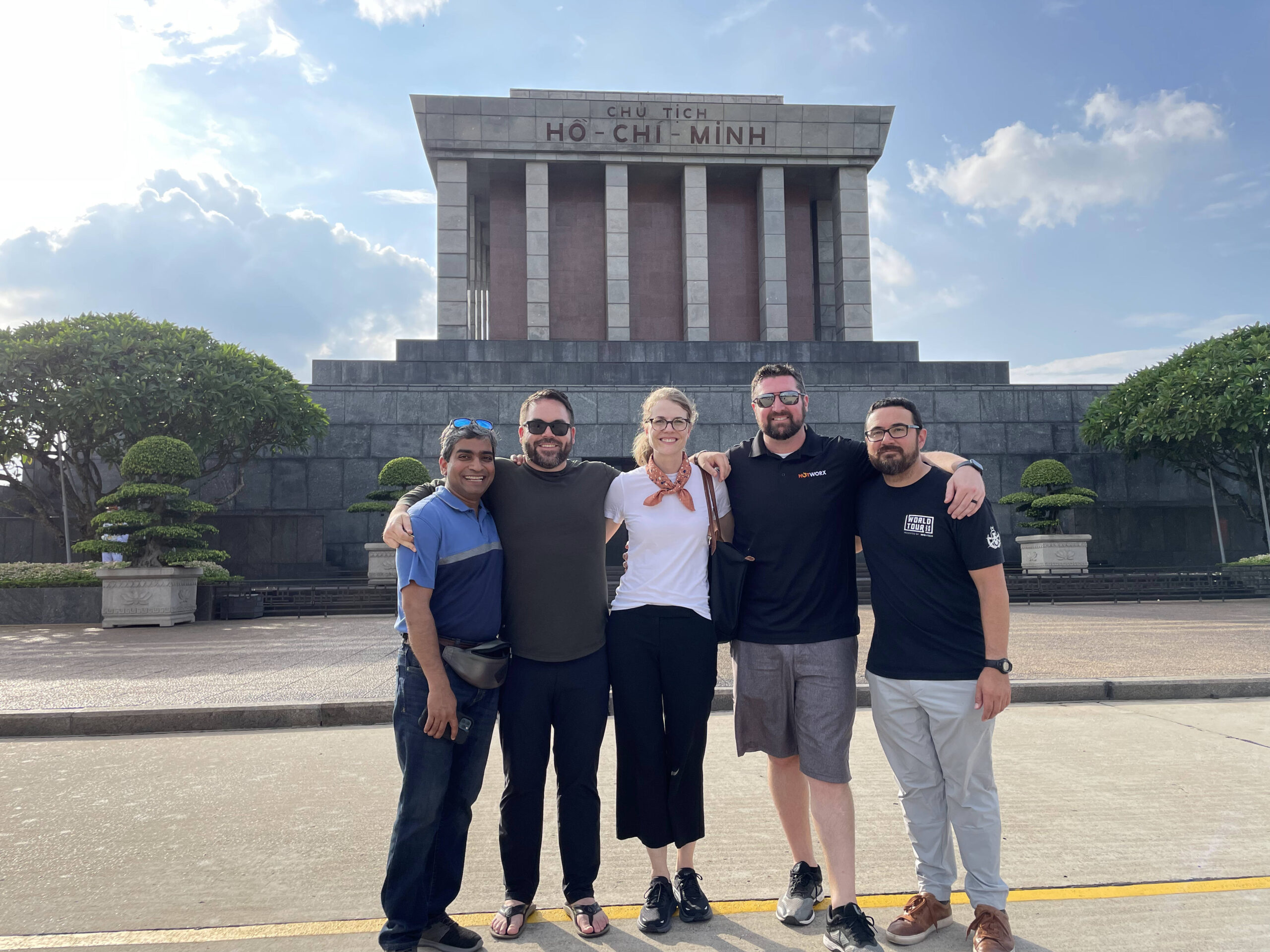In the rapidly expanding healthcare industry, physicians, once solely focused on patient care, are increasingly compelled to integrate medicine with business for greater efficiency and quality. Three physicians who earned their Executive MBA at Boise State University share how an MBA transformed their careers.

-
- Michele Ebbers, Medical Director of Supply Chain, St. Luke’s Health System
- Maltesh Gangappa, Medical Director, Sound Physicians, Saint Alphonsus Medical Center – Nampa, ID
- Josh Kern, Chief Medical Officer, St. Luke’s Health System – Magic Valley, Jerome and Wood River hospitals
Despite working within the same industry, each doctor pursued an MBA for unique reasons, leading to diverse journeys, learnings, and outcomes.
Why would a physician choose to pursue an MBA?
Diversifying Career: Ebbers was a full-time pediatric urologist heavily involved in patient care and surgery, who was volunteering on several committees to expand her impact at the hospital, but those commitments weren’t as fulfilling as she had hoped. She chose Boise State’s EMBA in order to diversify her career by leveraging her medical expertise and create a more meaningful change on healthcare as a whole.
Preparing for a Leadership Role: Gangappa was a hospital physician who recognized that his education and experience in healthcare did not prepare him adequately for leadership. He needed deeper knowledge in business issues such as profit and loss, margins, and competition, as well as personal and interpersonal tools to foster a thriving culture within his physician’s group. Instead of learning the hard way (on the job), he decided to pursue the MBA before getting into a leadership position.
Broaden Skill Set: Already in a Chief Medical Officer role, Dr. Kern realized he lacked formal business training in making critical business decisions. Kern recognized “that I likely had a Dunning Krueger style gap in my understanding of operational and business ideas. I specifically chose an MBA because I wanted a broader skill set then what an MHA offered.”

What was the Return on Investment (ROI)?
Created My Dream Job: Ebbers found the Executive MBA program transformative, providing her with insights into leveraging business concepts that can be used in all arenas. Armed with newfound language and confidence, she advocated to create a role where she could make an impact. “I found my dream job after completing the program and am now the Medical Director of Supply Chain for St. Luke’s Health System.”
Rapid Career Advancement: Gangappa’s EMBA experience brought both professional and personal development. Within three months of graduation, he was promoted to Associate Medical Director and subsequently Medical Director for his physicians’ group at Saint Alphonsus. He attributes the program with facilitating a deeper understanding of his leadership qualities and self-worth, which have contributed significantly to his current success.
Added Value and Opportunities: Although remaining in the same role after graduation, Dr. Kern experienced an increase in job satisfaction and efficacy. Leveraging his newfound knowledge base, he was able to pose more insightful questions and have a deeper impact with his teams. The degree also allowed him to expand his opportunities outside his organization, including taking on a paid board position and being named as a trustee for the College of Southern Idaho.
As a medical professional, why choose Boise State’s Executive MBA Program?
Boise State’s Executive MBA program strives to create flexible, innovative leaders. To achieve this, the faculty developed a unique, integrated curriculum which equips participants with essential business principles. The curriculum combines traditional business subjects (finance, marketing, economics, etc.) into real-world business topics such as Assessing Business Opportunities, or Creating Competitive Advantage, rather than teaching semester-long courses in each siloed business discipline.
“I found it really interesting to learn concepts that seem to be mostly “business” and then apply them to medicine or healthcare. I found design thinking to be very helpful in learning to approach messy problems (of which there are many in healthcare!), and I routinely apply that in my new role.” – Dr. Ebbers
As part of Boise State’s Executive MBA program, every participant works with a personal executive coach. Leadership coaching enables individuals to discover how one leads, and fosters their development into effective leaders within their respective organizations.
“I did not realize how much I would benefit from the coaching portion of the program. I would actually say that was the piece going into that I thought would be the least valuable and actually ended up being the most valuable. I am currently in a program to get certified as a coach myself.”– Dr. Kern
Leaders Unplugged and Guest Speakers:
EMBA participants are exposed to a wide array of leaders spanning various industries, including government, athletics, technology, theater, and non-profits. Through the Leaders Unplugged Sessions, participants engage in candid and intimate conversations with these leaders, who openly share their failures, insights gained, and proudest achievements.
“The most valuable part was hearing from the leaders in the Leaders Unplugged sessions about the different aspects of their businesses, including how they navigated through the highs and lows of their respective careers.” – Dr. Gangappa
A key component of business success and innovation is the ability to learn from others from diverse backgrounds. The Executive MBA program aims to enroll high-achieving, lifelong learners from a wide variety of industries to facilitate the exchange of ideas, acquire practical insights, enhance strategic thinking, and expand professional networks.
“The networking and the comradery of the class members themselves was remarkable. I learned so much just having lunch with an engineer and a farm equipment sales director. Being able to make connections outside of your professional silo is truly the best gift that this program offers.” – Dr. Ebbers
Participants engage in multiple real-world company projects throughout the program, enabling them to directly apply the skills they learned. This hands-on experience fosters critical and strategic thinking, culminating in presentations that deliver impactful results for the companies involved.
“I also thought my final project ended up being a very valuable lesson in taking a large undefined project and pivoting it into a manageable and defined project that we could achieve in the timeframe we had.” – Dr. Kern

How do physicians balance a busy work schedule while earning an MBA?
Boise State’s Executive MBA program acknowledges the demanding schedules of healthcare professionals. With EMBA’s condensed format of 3-4 days per month (Thursday – Saturday), participants can plan their calendars ahead of time. Additionally, the program provides top-tier services such as meals, parking, and class registration, allowing participants to maximize their learning.![]()
“It was admittedly difficult at times, I have a lot of work, still work clinically and have young kids (especially at the start of the program). But I had support from my organization and my wife and just ruthlessly carved out the time for it.” – Dr. Kern
“I mostly worked on the EMBA homework and projects in the evenings and part of the weekend. I had to delegate some of the cooking and cleaning, but that was ok with me! And I had to be cognizant of not taking on extra projects at work during those 2 years. But if you made it through medical school, you can make it through this workload!” – Dr. Ebbers
After graduating… An MBA from Boise State isn’t just a degree to hang on the wall…
Here’s how these doctors utilized their newfound knowledge:
“I was a very anxious speaker prior to starting EMBA, but the program gave me plenty of opportunities to figure out my style and gain confidence in my ability to think on my feet and convey my message in a way that can be understood.
I recently had a situation where I needed to step into a conflict between an individual and a group, and I used the coaching and negotiation tools that I learned in EMBA to help diffuse the anger and to get both sides to see a possible way forward.” – Dr. Ebbers

“As an organization, Sound Physicians operates on a national level with hundreds of programs spread across the four time zones in the United States. Recently, Sound made a decision to delegate major decisions to the program director at each level to enable quick and necessary adjustments. This change brought business statistics, decision-making, and people management closer to each program. My business degree has been a great asset in helping me understand and lead our team effectively.” – Dr. Gangappa

“On an ongoing basis the ideas in negotiations, the concepts of leadership and communication were the highest yield for me. I will never be a CFO of an organization but the lessons in basic accounting and finance give me a great basis to understand the language more clearly in a business context.” – Dr. Kern
Advice for future MD-MBAs
“The most valuable parts of this program are the people and the self-learning. The professors are all very engaged with the individuals. I also really appreciated the self-learning and leadership development, best captured in the coaching and assessment tools. I still go back to those to remind myself the things I need to be aware of and work on in order to continue to grow as a leader.” – Dr. Ebbers

“I was reflecting on the fact that physicians are called on to be the leaders of teams and yet have widely variable actual training in what leadership even means. This is even more true as the push to safety culture means flattening hierarchies – which flies in the face of the historical very hierarchical “leadership” structure that was modeled in medicine. I think an MBA opens your mind to being better at the clinical leadership also.” – Dr. Kern

Dr. Ebbers, Dr. Gangappa, and Dr. Kern leveraged their MBA degrees to create new opportunities, accelerated role advancement, and expanded skill sets. Boise State’s Executive MBA program stands out for its contribution to their development through its distinctive curriculum, personalized leadership coaching, and exceptional speakers, which equip physicians with essential business acumen and foster transformative growth for leadership in healthcare and beyond.
Learn more about Boise State’s Executive MBA Program or let us tell you more!